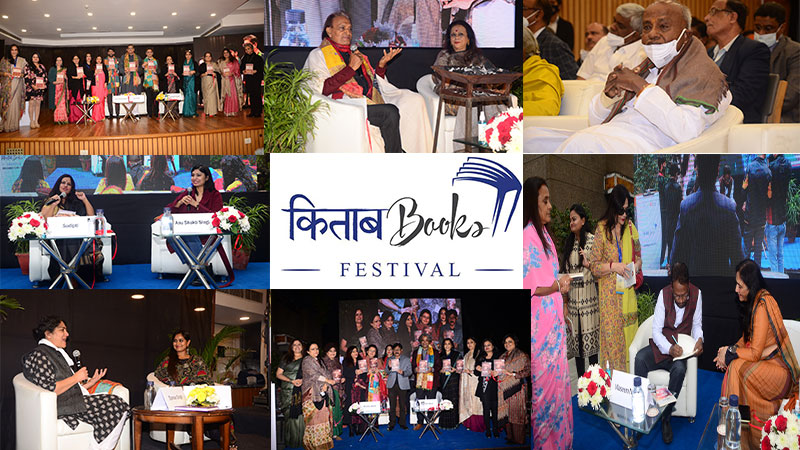 Kitaab Festival
Kitaab Festival
Kitaab Festival in Delhi draws booklovers
Prabha Khaitan Foundation organised a week-long Kitaab Festival in Delhi presented by Shree Cement, from 13 to 17 December, where English, Hindi and Urdu literatures were celebrated in the company of a niche audience. Eleven books were launched in these 5 days at the India International Centre in New Delhi.
Day 1:
The festival kickstarted with the launch of former Prime Minister Mr H D Deve Gowda’s first biography titled “Furrows in a Field’’,written by Sugata Srinivasaraju and published by Penguin Random House India, in the presence of Mr Deve Gowda himself.
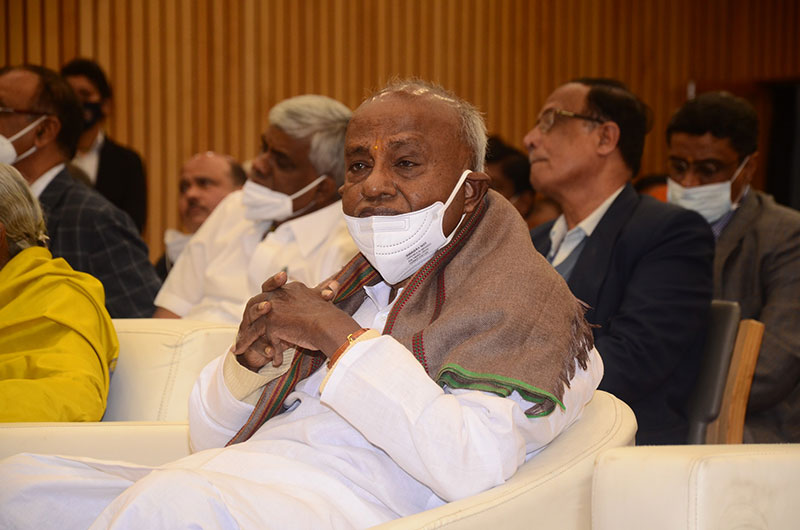
An august gathering comprising politician and chairman of Jammu & Kashmir National Conference and former chief minister, J&K, - Farooq Abdullah; politician and leader of the Communist Party of India, and a member of the Politburo of the Communist Party of India - Sitaram Yechury; and economist, historian and politician and MP, Indian National Congress - Jairam Ramesh shared their views about Mr Gowda amid a discerning audience.
The Festival commenced with Neelima Adhar giving the welcome speech. Anindita Chatterjee, Executive Trustee Prabha Khaitan Foundation, felicitated H.D.Deve Gowda, while Archana Dalmia, Ehsaas Woman of Delhi and Unnati Singh, Ehsaas Woman of Indore felicitated the panellists. The book was launched by Fali Sam Nariman, through Youtube Live, and the panellists and Ehsaas Women present at the venue. Before the three stellar personalities spoke on stage and the author shared why he chose his subject to pen a biography, the internationally recognized jurist and senior advocate, Supreme Court of India, Fali Sam Nariman paid glowing tributes to the former prime minister. “My wife and I always believed that Mr Gowda not only has a good head but a great heart as well,” he said. “For him, it has been a mixed bag of victories and defeats, of accolades and criticism, but as a statesman and diplomat, he remains unscathed and untarnished.”
Farooq Abdullah said some deeply moving words about Mr Deve Gowda, and said that he wants people to remember “how human he is.” He recalled meeting him several times when, “Mr Gowda decided to visit Kashmir during some very difficult times. He wanted to make a new beginning and find a way forward.”
On the occasion, Author Sugata Srinivasaraju in his address revealed, "When I started working on this book, in early 2019, people scoffed at me. They asked does Mr. Gowda deserve a Penguin biography? What has he really done? Is there enough to fill up the pages? Now at the end of 2021, when they hold a 600 page book, they say this is a 'rehabilitation' of his legacy. I am glad that they now realise that he has a legacy, but I have to often correct them by saying that this book project is not about 'rehabilitating' anybody but about restoring the balance.”
He further added, Mr Gowda's democratic engagement was stellar and deep. This should have been celebrated in our democracy, but we did not seem to care. And our moment of introspection stares at us now, in 2021, when the din of our democracy being threatened has reached a crescendo. We sometimes ignore certain people, certain moments and context in history at our own peril.
Veteran leader Sitaram Yechury during his brief speech said, “There’s very little to add to what all has already been said about Mr. Gowda, but none of us were aware of his caste.” He also praised the writer for his deep insight into political discussions that took place with the approval of the Congress and CPI(M), the sitting Chief Minister of Karnataka, H. D. Deve Gowda, was asked to head the coalition as Prime Minister after V. P. Singh and Jyoti Basu declined. He had not even completed 3 years of his chief ministership. But he told Mr Basu, “We need to save India together.”
Jairam Ramesh called the book “an admirable biography and a first rate biography based on rich history.” He said that to write a biography in a subject’s lifetime is very difficult, and addressed Mr. Gowda as ‘Politicsjeevi’ for his engagement with politics for 60 years. Generally, biographies are judgmental – they are either hagiographies or full of criticism. But very few of them are Prashthis or charitas in the truest sense of the term. It’s a narrative biography.”
The book release was followed by a conversation with Author Sugata Srinivasaraju, Milee Ashwarya, Publisher, Ebury Publishing and Vintage, Penguin Random House India and the session was moderated by Praneet Bubber- Ehsaas Women of Amritsar. The vote of thanks was delivered by Neelima Dalmia.
Day 2
The second day of the Kitaab Festival deliberated over women, poetry, love, laughter and photography. Organised at the plush green ground of India International Centre, the day witnessed the launch of four books and engaging discussions. The release of the books was spread over four brief sessions involving discussions and entertaining conversations, which are also available on the foundation’s Youtube channel. All the sessions were initiated and felicitated by Ehsaas Women, who came from Delhi, NCR and other parts of India.
The first session began with the launch of the book “Hindi Ki Pahli Adhunik Kavita” authored by Sudipti. The session was inaugurated by Anantmala Potdar, Ehsaas Woman of Delhi and the panellists were felicitated by Unnati Singh, Ehsaas Woman of Indore. While in conversation with Anushakti Singh, the author joyfully revealed her research about finding original marks of new and modern Hindi poetry in the trajectory of the history of Hindi literature. Sudipti's debut book “Hindi ki Pahli Adhunik Kavita” talks about how Hindi evolved over a period of time with shades and hues of Urdu, Arbi, and Farsi. The session came to an end with the vote of thanks from Anantmala Potdar.
In the second session, the book 'Rangon ki Manmani’ by Waseem Nader, was inaugurated by Shazia Ilmi, Ehsaas Woman of Delhi, and the panellists were felicitated by Nidhi Garg, Ehsaas woman of Bhubaneswar. This captivating and charming session in Urdu began with the felicitation of Waseem Nader and conversationalist Abhinandan Pandey by Shazia Ilmi, Ehsaas Woman of Delhi. During the discussion, Waseem expressed his thoughts on what he considers about the strong Arabic influence on the Urdu language.
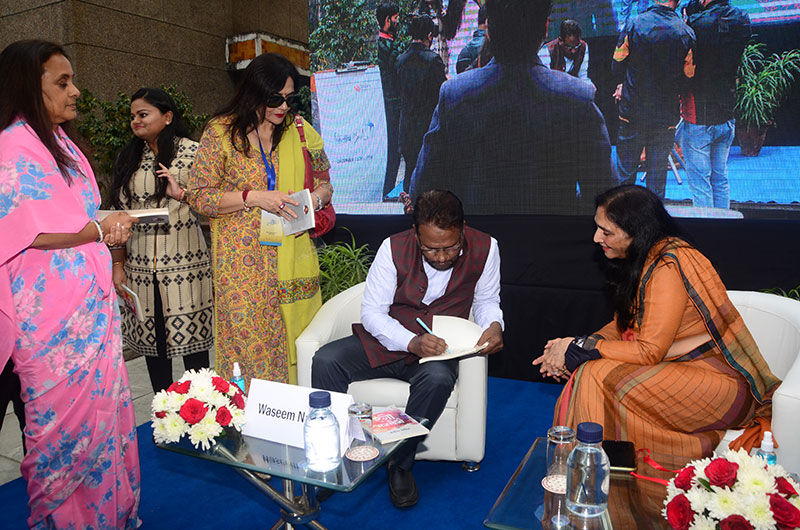
Waseem said any language which gives a strong connection with the masses and doesn't offend is good, and for that matter, the influence of a foreign language doesn't really matter. Waseem also answered why youth today are so fond of Shayari and ghazal instead of other intricate formats like rubai and nazms. The session concluded with the vote of thanks from Shazia Ilmi.
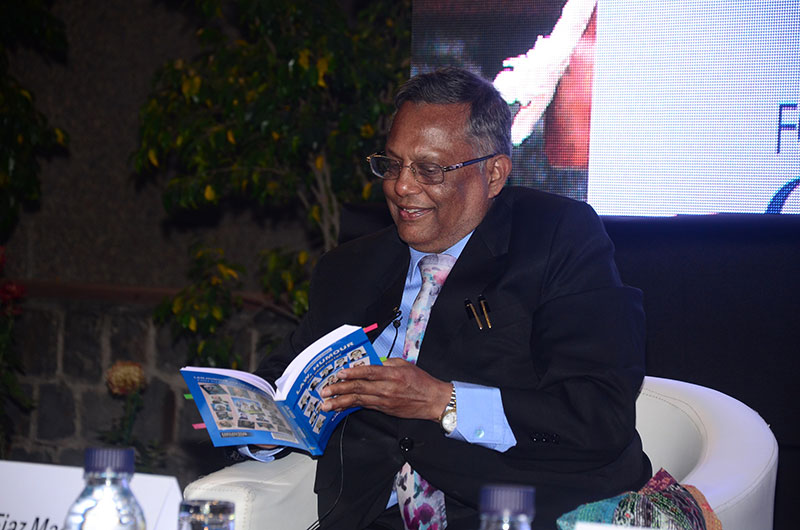
The third session took place with the inaugural speech by Huma Khalil, Ehsaas Woman of Delhi. The author and the conversationalist were felicitated by Aradhana Pradhan, Ehsaas Woman of Noida. This session captured the highest laughter. During the course of conversation at the book release ‘Law, Humour, and Urdu Poetry', a book edited and compiled by Advocate Ejaz Maqbool, he said “Paida Huaa Wakeel To Shaitaan Ne Kahaa Lo Aaj Hum Bhi Sahib -e Aulaad Ho Gaye” (When a lawyer was born, Demon said, I have become father of a child). Speaking about humour in the most stressful moments of legal proceedings and other amusing legal cases from the book, advocate Maqbool shared his experiences and stories stating how Urdu is innately and intrinsically linked with the courtroom. In conversation with Hasan Zia, he emphasized the importance of humour during the most stressful moments. The book talks about funny anecdotes given by eminent advocates and judges during the courtroom proceedings, making courtroom hearings more humane and realistic. The audience was intrigued by the long hours and hard work which went into compiling humour and Urdu poetry used during legal proceedings and case discussions. The session’s concluding note was delivered by Huma Khalil.
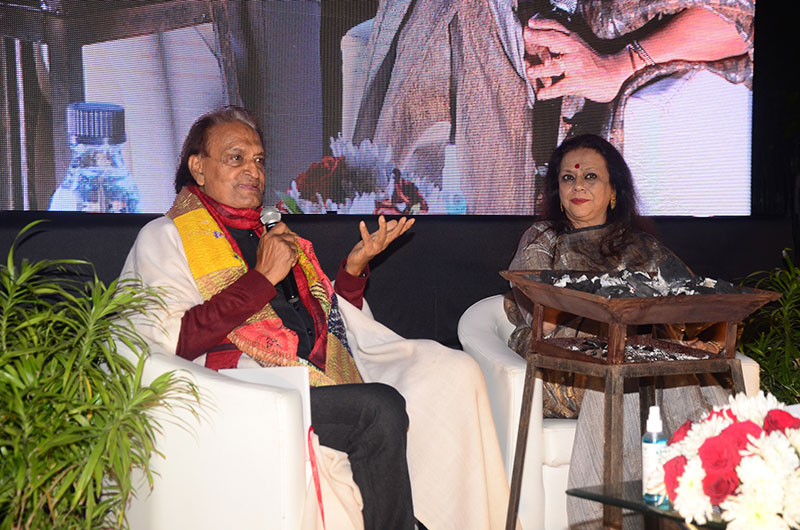
The fourth and last session took place with the release of the book ‘Satyajit Ray’ by Raghu Rai, this session was initiated by Huma Khalil, Ehsaas Woman of Delhi. The ace photographer was felicitated by Archana Dalmia, Ehsaas Woman of Delhi. In conversation with Ina Puri, Ehsaas Woman of Delhi, Rai said, “the mystery of every individual comes across only once in a while when you make yourself available mentally, physically, spiritually to feel, to understand, to perceive the person.
This is where his book is unique” he also spoke about the astonishing shots of the world renowned filmmaker in his book and his craftsmanship in translating emotions into visual experience. He disclosed what he felt about his relationship with Satyajit Ray, whom he fondly called Manikda. Raghu recalled, once Ray isolated himself to experience tranquillity, and denied anyone. Yet, he agreed to meet Rai, when Rai expressed his desire to be with the legend. Rai confessed to him that he had no purpose, but wanted to be with the man. Rai mentioned such instances unearths an individual's personality and was the instance when he felt close to Satyajit Ray. During the conversation, Rai also reminisced about his personal journey of photography. Huma Khalil concluded the session.
Describing the session, conversationalist and Ehsaas Woman of Delhi Ina Puri said, “On the second day I was delighted to be in conversation with the legendary Raghu Rai on his newest release Dadu on Satyajit Ray which I had collaborated on as a writer documenting the incredible friendship of Ray & Rai. Our dialogue was interspersed with anecdotes and personal memories that had the listeners riveted. This was Raghu Rai’s first interaction with Ehsaas Women and since it was a Prabha Khaitan Foundation publication, it was even more special.”
Day 3
The third day of the Kitaab Festival captured thought provoking conversations over politics, nationalism, Kashmiri genocide, and religion.
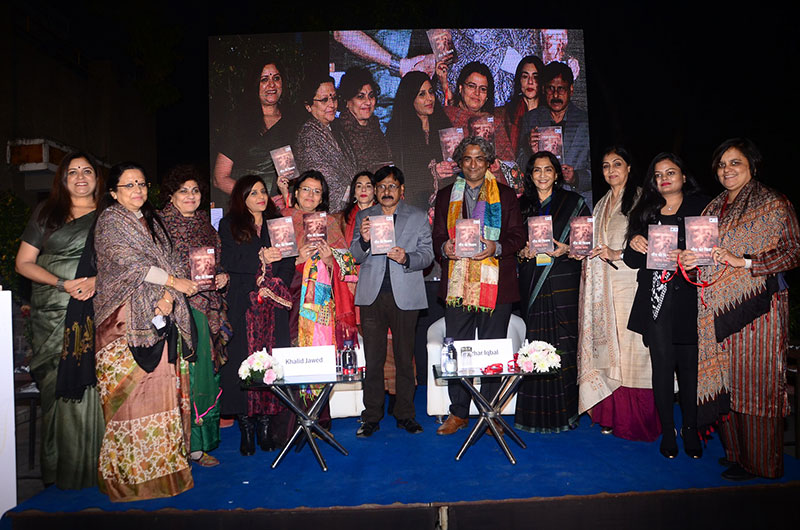
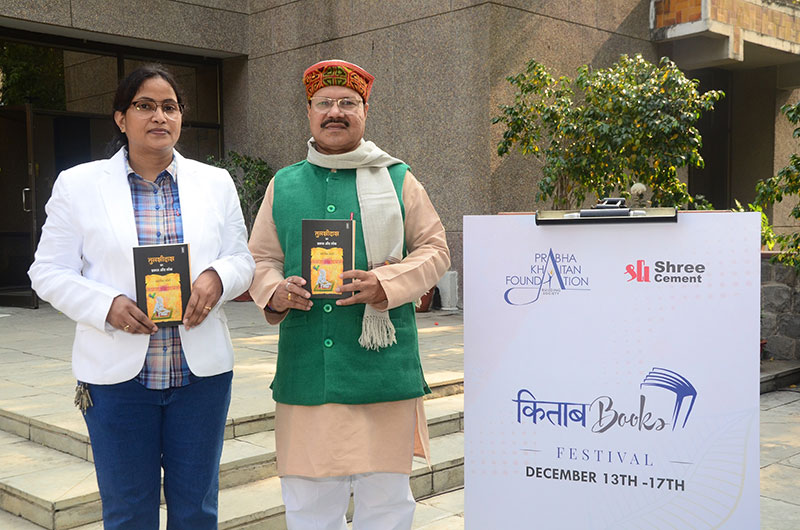
The power-packed day started with Aradhana Pradhan, Ehsaas Woman of Noida, giving the welcome note. Anshu Mehra, Ehsaas woman of Meerut, felicitated the panellists. Intense discussions and statements around religion and politics started when Jyotish Joshi explained Tulsidas’s relevance in modern times. In conversation with Dr. Sunita, he asserted that one cannot get a full view of a subject until one has the patience to read it in detail. Let us not mock and reject Ram or Ramayan without making a sincere effort to look at him in a holistic manner. He attempted to explain the relevance of Tulsidas in today’s time and date, and how as a human, he imparted profound values to us through his new book Tulsidas ka Swapna aur Lok. During the course of the session, Jyotish Joshi said Tulsidas is the reason for the faith we have in the truth of Ram. Aradhana Pradhan concluded the session with her vote of thanks.
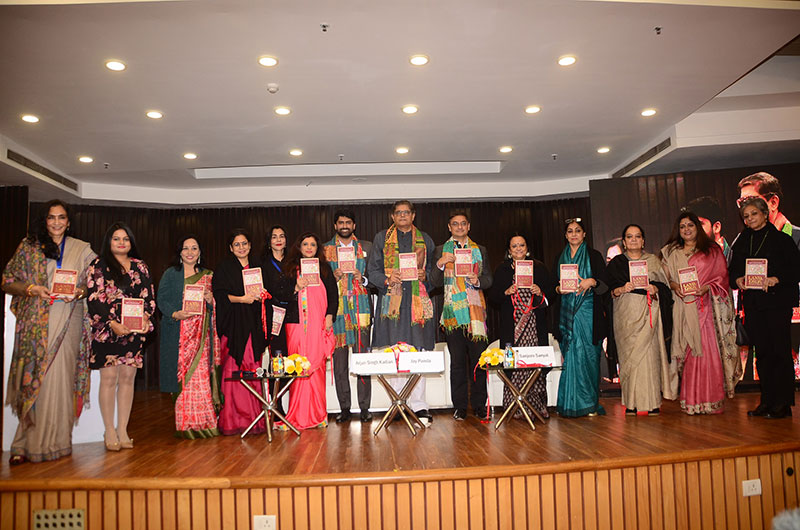
The day progressed with a second discussion, where Neelima Dalmia, Ehsaas woman of Delhi, gave the welcome note. Poonam Anand, Ehsaas Woman of Ranchi felicitated the guests.
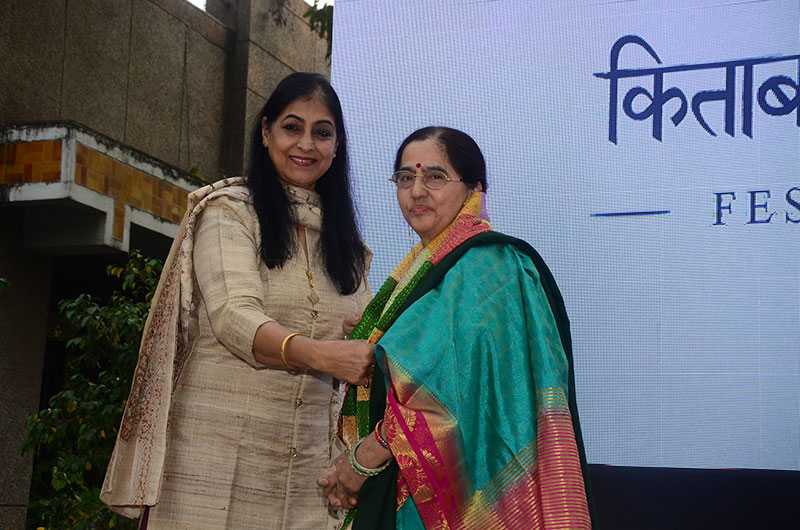
The session held some highly debatable and heated discussion about the Kashmiri genocide and mass exile with author Kshama Kaul. At the release of Kshama Kaul’s new book Murti Bhanjan, she said “Don’t kill me for being a Hindu, give me a sword and I will kill ten militants with it”. She elaborated that her new novel is based on a real-life catastrophe of the war-like situation she had to encounter decades ago. And her new novel talks about the tragedy of Kashmiri Hindus who were brutally murdered, calling it a genocide that triggered mass exile. She said it is the most atrocious and cold-blooded event in the history of India. She described how terrorism crumbled and destroyed them and mourned that nobody came to their rescue. Lamenting that Delhi did not treat them with respect when they arrived in the capital penniless. Talking about the heart-wrenching experience, Khema was teary-eyed on stage. She said she wrote this book so that nobody has to suffer again. Neelima Adhar concluded the session.
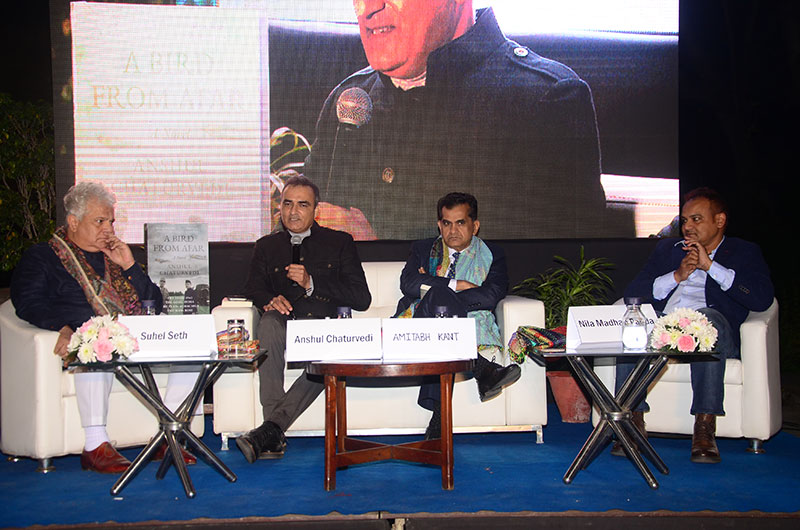
“A Bird From Afar”, a novel by Anshul Chaturvedi marked the third launch of the day. The session was inaugurated by Shinjini Kulkarni, Ehsaas Woman of Noida and Garima Mithal, Ehsaas Woman of Meerut, felicitating the panelists. It was a dazzling affair as Suhel Seth, Amitabh Kant, (CEO Niti Aayog), Neela Madhab Panda were present at the venue to congratulate Anshul for his phenomenal work. Neela Madhab expressed “It is the most incredible fictional book I have ever read”. Anshul read a few excerpts from his book for the audience. It discussed that the death of Subhash Chandra Bose overshadowed his life and people didn’t know much about the philosophy and beliefs he nurtured. This book unveils facets of his life and not death. Anshul mentioned that this novel is not a political book he had no pre-fixed mindset when he explored, he had no target audience to placate. He said “I have a thought process and it’s a story.” He has positioned the narrative of the story to point out that we don’t look at military thoughts with as much nuance as we should. Amitabh Kant congratulated Anshul for his new book and said those who fought for India must read the book. Neela Madhab Panda said it’s an incredible fictional history book. Anshul read a few excerpts from his book for the audience. The session concluded with Shinjini Kulkarni delivering the thank you vote to the audience and guests.
The last session of the day was inaugurated by Shazia Ilmi, and the guests were felicitated by Anshu Mehra, Ehsaas Woman of Meerut. The session had an intriguing discussion over Khalid Javed’s newest creation “Maut Ka Kitaab”, between Khalid Javed and Azhar Iqbaal. Azhar asked if Khalid considered himself as an outsider of Urdu fiction, to which he replied that he followed the language of his soul and believed in the original expression. One should not follow fashion or copy others. Jawed also revealed a snippet of his book, the protagonist in his novel anticipates and prepares to commit suicide but doesn’t kill himself, “Idea to commit suicide is better than suicide” Jawed indicated. Khalid Javed is an Indian novelist and leading Urdu fiction writer. He has penned novels like Nemat Khana and Ek Khanjar Pani Mein previously. Author Rakshanda Jalill was present during the unveiling of the book. The session was concluded by Shazia Ilmi.
Day 4:
Day Four of Prabha Khaitan Foundation’s Kitaab Festival was all about destroying taboos around mental illness. Daman Singh’s book Asylum was released on this day. It held a captivating session in an interview format with Author Daman Singh and Priyanshi Patel, Ehsaas woman of Ahmedabad. The release of the book involved discussions and gripping conversations. The insightful session was introduced by Archana Dalmia, Ehsaaas Woman of Delhi. Author Daman Singh was facilitated by Preeti Gill, Ehsaas Woman of Amritsar. Gill is a publishing professional, who expressed herself amid the session saying “today’s session is interesting and I want to know more about data that tells how trauma had impacted people who came from partition and communal conflict.”
“I wasn't formally permitted to visit asylums for my research. It can take years to get permission”, Daman Singh said during the discussion at the book launch. Daman further said as a writer and researcher she wanted to see things for herself but she also saw the point that a mental hospital is not just any hospital. It is a place where privacy and confidentiality is a big issue. There is a shortage of mental healthcare professionals that many people do not get a chance to receive treatment. Asylum provides a panoramic view of mental health infrastructure and covers all aspects such as historical, philosophical, governmental, and medicine from an ordinary person’s perspective. The book is the story of how mental healthcare in India has evolved over the last 125 years. “When it comes to maladies of the mind, there is an enduring culture in the Indian subcontinent of turning to the occult, to faith, and to traditional methods of healing.” says Daman Singh in her new book Asylum, the battle for mental healthcare in India.
During the course of a riveting conversation with Priyanshi Patel, Daman Singh was asked what intrigued her to write a book on mental healthcare. To which she answered it started just as an interest in psychology and then over the period of time it grew stronger and became an idea to write. It was difficult to write this book. And it took her 4 years to complete it.
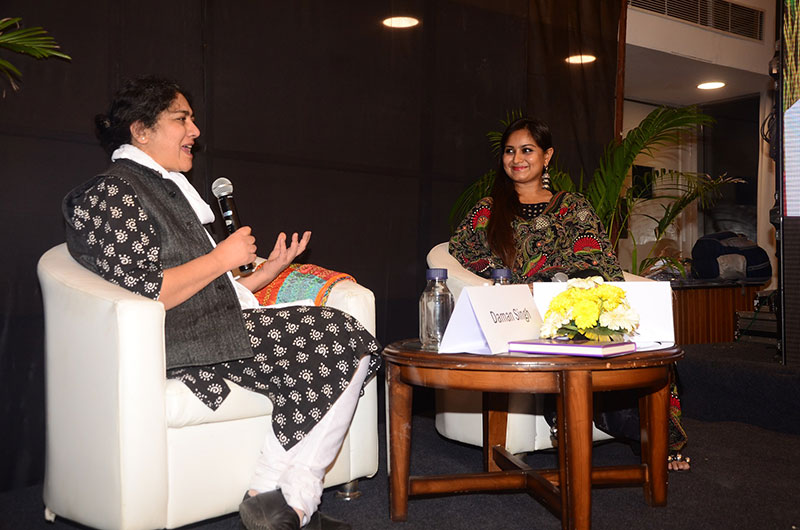
She was further asked, the way she has arranged the book, what did she want the reader to take away from it? She answered, there is a lot of taboo around the term “mental illness” and we don't talk about it as openly and as often as we should. Her book is not about mental illness or how to deal with it but it is the story of how mental health care in India evolved over the last 125 years. It is a story that starts with a mental hospital in the country and it brings us up to date. In today's India mental hospitals are a very tiny part of the healthcare landscape.
The session buzzed around history and the current status of the mental health system in India. Her book includes data and studies dating back to 18 century. Revealing more about her book she said that in the 18th century, Asylums were set up for the insane, as the word was commonly in use, across British India. These asylums were dark, dreary, and oppressive places. These were places meant to confine and control the insane.
However, from the 19th century, an alternative way of thinking had emerged. It was felt that insanity is not something supernatural influenced by the planets or by evil forces or occult. It is like any physical ailment. It is something that happens within the body and just like we treat physical ailment we should also treat mental ailments. That sort of thinking led to changes in different parts of the world and asylums began to be reimagined or redeveloped as mental hospitals. Singh’s dialogues invoked endless discussions and confabulation with the intent to understand the mental health care system with a comprehensive perspective.
While talking in a discussion at the book launch Neelima Dalmia Adhar, said, “Daman Singh’s book Asylum is detailed and meticulous documentation on the asylums in India. Declining mental health is the real pandemic. Millions are trapped within their minds. The narrative is slowly changing because we need to wake up to know that it's okay not to be okay.” She further added that Asylum is a must-read to get a feel of this rare sensitive study on this subject.

Day 5:
On Friday, December 17, Prabha Khaitan Foundation’s Kitaab Festival concluded the last day of its week-long festival, at India International Centre, with the launch of the book Lands Of The Gods by author Arjun Singh Kadian The book was released by Baijayant ‘Jay’ Panda & Sanjeev Sanyal . The session was introduced and initiated with an inaugural speech by Anantmala Potdar, Ehsaas woman of Delhi and the panellists was felicitated by Vandana Singh, associate Sur aur Saaz. The session was moderated by Shazia Ilmi, Ehsaas Woman of Delhi. The book speaks about the story of how Haryana transformed itself from the seventeenth century to the second decade of the twenty-first century. And it writes about the shaping of modern Haryana, with its economy, politics, important personalities, and other themes are discussed.
During the panel discussion, Ilmi asked Singh “Did you understand the fact that the course of Indian history would have been very different and that has not been talked about ?” To which Singh answered that “How history is written and how history has been taught to all of us through our schools and college needs a remarkable change now. We need to bring in more context to our history and make it more relatable.”
Sanjeev Sanyal was asked by Ilmi that “What do you think when you talk about Mughal emperors needing to differentiate between liberal Akbar and intoxicated Jahangir and a very austere Aurangzeb instead of clubbing them and calling them Mughal emperors.” To which Saniyal expressed his opinion saying “For a writer, it is important that whatever you say should be properly referenced and backed by credible records for cross-reference. I don't understand why you expect historians to agree on something that happened 500 years ago when you just have to put on television that nobody agrees on what happened yesterday.” The discussion remained centred around history and parts of the book.
The festival was concluded with Neelima Adhar, Ehsaas Woman of Delhi, giving the concluding speech.
Support Our Journalism
We cannot do without you.. your contribution supports unbiased journalism
IBNS is not driven by any ism- not wokeism, not racism, not skewed secularism, not hyper right-wing or left liberal ideals, nor by any hardline religious beliefs or hyper nationalism. We want to serve you good old objective news, as they are. We do not judge or preach. We let people decide for themselves. We only try to present factual and well-sourced news.







